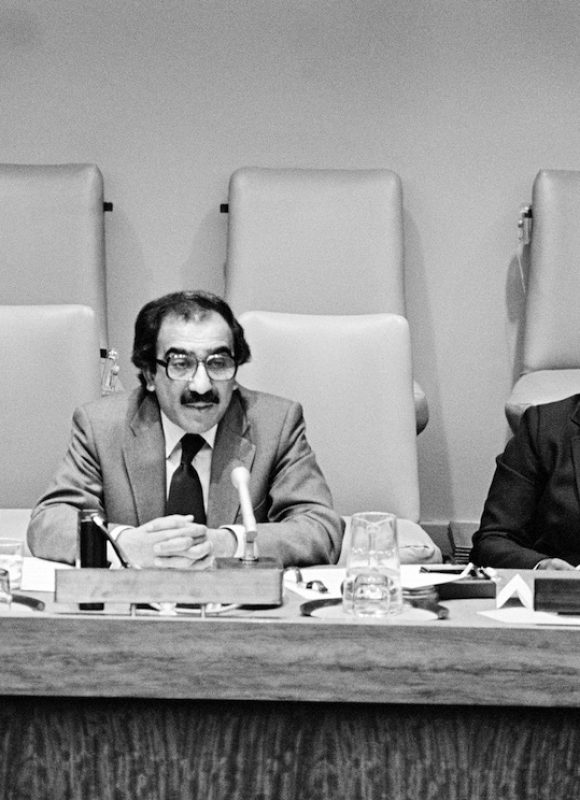PIONEER
Abdul Kader Asmal

Politician | Negotiator | Educator,
Born: 8 October 1934 Died: 22 June 2011
“Human rights are never static; they are always dynamic. They are never completely won, just as they are never completely lost. In our defence of them, we too cannot afford to stand still. We need constantly to seek to improve how and by what means we can promote and protect the rights set out in our own Bill of Rights. This is the challenge that Parliament faces.”
Who is
Abdul Kader Asmal?
Exiled freedom fighter and lawyer involved in drafting the Bill of Rights and the Constitution, as well as a Minister in the first democratic Parliament.
Professions
and Roles
Teacher, lawyer, academic, African National Congress (ANC) National Executive Committee (NEC) member, ANC negotiating team member, Minister of Water Affairs and Forestry, Minister of Education, environmental activist, free press activist.
Best Known For
Starting the British and Irish anti-apartheid movements in the 1960s, and being a member of the Constitutional Committee of the ANC.
Life highlights
- Asmal studied teaching in Durban in 1954, law at the London School of Economics in the UK in 1959, and lived in exile until 1990.
- He taught at Trinity College in Dublin for 27 years. While in Dublin he founded the British and Irish anti-apartheid movements, and at the international level he campaigned for freedom and a non-racial democracy in South Africa.
- He served as a member of the Constitutional Committee of the ANC in Lusaka and was responsible for drafting the ANC’s first Bill of Rights.
- Asmal returned to South Africa in 1990 and was elected onto the ANC’s NEC. He was the ANC delegate to Working Group 1 of the Convention for a Democratic South Africa (CODESA) in 1992 and then in 1993, he became a member of the negotiating team for the ANC at the Multi-Party Negotiating Forum.
- He served as Minister of Water Affairs and Forestry in the first democratic cabinet, and then was appointed as the Minister of Education in 1999.
IN THEIR OWN WORDS
“South Africa has made its successful transition to democracy under a Constitution forged in the most adverse circumstances. There was endemic violence in the country. Historic enmities dogged the work of peacemakers … The constitutional challenge was enormous: How to construct from the chaos of apartheid workable arrangements whereby South Africans could move from fear and repression to confidence and democracy. It seemed impossible, but hope prevailed and South Africans began discovering one another.’
“Let us admit it. Our [Interim] Constitution is untidy, messy, disjointed and beautiful, just like South Africa. It is too detailed. Many of the matters in it should be left for legislation, for the Forum of Parliament … It has proved, despite the warts and blemishes, to be more than an adequate vehicle to transport us from an evil order to one where justice is a distinct prospect for all.”
“The [Final] Constitution should be made by the people for the people … It should represent the interests of the people; otherwise it means nothing. This Constitutional Assembly, therefore, is the agent of the people… The final Constitution, in the vision of the ANC, must be a tribute to our history, our wounded, our dead and all our people. It must draw on the deep reserves of an alternative vision of how our society can be organised …”
– Kader Asmal
IN THE WORDS OF OTHERS
“It was actually very exciting working with Kader. When he returned from Ireland he brought a remarkable energy to the work we were doing at the time. I don’t know anyone else like Kader. He never ran out of encouragement … You could always get words of wisdom from him.”
– Pius Langa, Former Chief Justice of the Constitutional Court
“All of us who knew and worked with him … could always depend on him as a steadfast fighter for the liberation and advancement of the interests of all South Africans.”
-Thabo Mbeki, Former President of South Africa
“He will be remembered for his energy, forthrightness, efficiency and commitment to making this country a better place each day. He will also always be remembered for his passion for human rights for all.”
– Jacob Zuma, Former President of South Africa
Parliament of the Republic of South Africa (2018) Theme Committee Book Series 1-6
